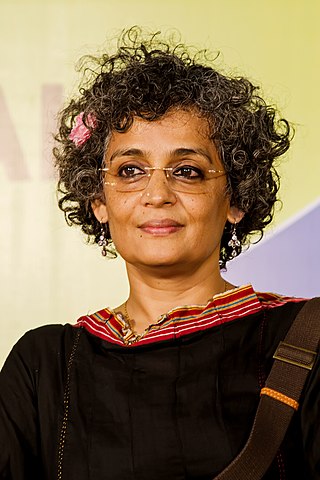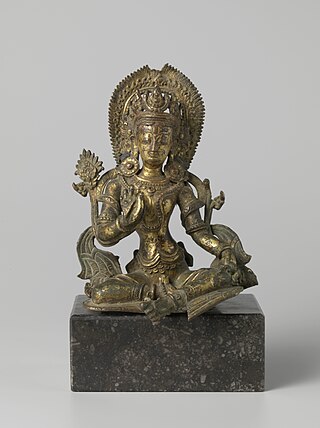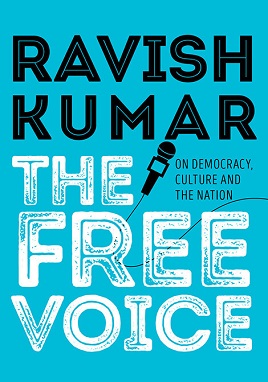Related Research Articles

Suzanna Arundhati Roy is an Indian author best known for her novel The God of Small Things (1997), which won the Booker Prize for Fiction in 1997 and became the best-selling book by a non-expatriate Indian author. She is also a political activist involved in human rights and environmental causes. She was the winner of the 2024 PEN Pinter Prize, given by English PEN, and she named imprisoned British-Egyptian writer and activist Alaa Abd El-Fattah as the "Writer of Courage" with whom she chose to share the award.
In Hinduism, Itihasa-Purana, also called the fifth Veda, refers to the traditional accounts of cosmogeny, myths, royal genealogies of the lunar dynasty and solar dynasty, and legendary past events, as narrated in the Itihasa and the Puranas. They are highly influential in Indian culture, and many classical Indian poets derive the plots of their poetry and drama from the Itihasa. The Epic-Puranic chronology derived from the Itihasa-Puranais an influential frame of reference in traditional Indian thought.

Damayanti is a figure in a love story found in the Vana Parva book of the Mahabharata. She is the daughter of Bhima and a princess of the Vidarbha Kingdom, who marries King Nala of the Nishadha kingdom. The figure is also found in other Hindu texts by many authors in numerous Indian languages. She, along with Nala, are the central figures in the 12th century text Nishadha Charita, one of the five mahakavyas in the canon of Sanskrit literature, written by Sriharsha.
In Hindu mythology, Sarama is a mythological dog being referred to as the female dog of the gods, or Deva-shuni. She first appears in one of Hinduism's earliest texts, the Rig Veda, in which she helps the king of the gods Indra to recover divine cows stolen by the Panis asuras. This legend is alluded to in many later texts, and Sarama is often associated with Indra. The epic Mahabharata, and some Puranas, also make brief reference to Sarama.

Bibek Debroy is an Indian economist, serving as the chairman of the Economic Advisory Council to the Prime Minister of India. He is also the Chairman of the Finance Ministry's 'Expert Committee for Infrastructure Classification and Financing Framework for Amrit Kaal'. Debroy has made significant contributions to game theory, economic theory, income and social inequalities, poverty, law reforms, railway reforms and Indology among others. Bibek Debroy's recent co-authored magnum opus, Inked in India, stands distinguished as the premier comprehensive documentation, capturing the entirety of recognized fountain pen, nib, and ink manufacturers in India.

Indrani, also known as Shachi, is the queen of the devas in Hinduism. Described as tantalisingly beautiful, proud and kind, she is the daughter of the asura Puloman and the consort of the king of the devas, Indra.

Avishkaar is a 1974 Indian Hindi-language film. Produced and directed by Basu Bhattacharya, the film stars Rajesh Khanna and Sharmila Tagore. The film was the part of Basu Battacharya's introspective trilogy on marital discord in an urban setting, which included Anubhav (1971) and Griha Pravesh (1979). Khanna had waived 70% of his remuneration to star in this project.

Thodur Madabusi Krishna is an Indian Carnatic vocalist, writer, activist, author and Ramon Magsaysay awardee.

Senthamizhan Seeman is an Indian film director, actor and politician. He is the leader and chief-coordinator of the Naam Tamilar Katchi political party in Tamil Nadu. He is a strong advocate for regional autonomy and Tamil nationalism by focusing on the Tamil language, identity, and culture.

Ramji Rao Speaking is a 1989 Indian Malayalam-language comedy-thriller film written and directed by the duo Siddique–Lal and produced by Fazil, Swargachitra Appachan, and Ousepachan Vaalakuzhy. It stars Sai Kumar, Mukesh, Innocent, Vijayaraghavan, Devan, Rekha, with Sankaradi, Sukumari, Kunchan and Mamukkoya in other supporting roles. The film deals with social factors affecting Kerala including unemployment during the 1980s, and went on to achieve a cult classic status.
The Shanti Parva is the twelfth of eighteen books of the Indian Epic Mahabharata. It traditionally has 3 parts and 365 chapters. The critical edition has 3 parts and 353 chapters. It is the longest book among the eighteen books of the epic.

Ashoka University is a private research university located in National Capital Region (India), providing a liberal education in the humanities, social sciences, and natural sciences. It was founded in 2014 and is based on the model of collective philanthropy, with 200+ founders across various industries.
Hindol Sengupta is an Indian historian, academic, and journalist. Sengupta lives in Delhi and is professor of international relations at O. P. Jindal Global University. He has been Vice President, Invest India, the national investment promotion agency of the government of India, and Editor-at-Large at Fortune India where he writes a weekly column. He is also a columnist for Aspen Italia and The New Indian Express.

Parakala Prabhakar is an Indian economist and political commentator. He served as communication advisor in the Government of Andhra Pradesh from July 2014 to June 2018. For several years, he presented current affairs discussion programme on Telugu television channels, such as Pratidhwani on ETV2 and Namaste Andhra Pradesh on NTV.

Divya Dwivedi is an Indian philosopher and author. She is an associate professor at the Indian Institute of Technology, Delhi. Her work includes a focus on philosophy of literature, aesthetics, philosophy of psychoanalysis, narratology, revolutionary theory, critical philosophy of caste and race, and the political thought of Gandhi. She is the co-author of Gandhi and Philosophy: On Theological Anti-politics and Indian Philosophy, Indian Revolution: On Caste and Politics.
Godi media (Hindi pronunciation:[ɡoːdiː]; lit. 'media sitting on lap'; idiomatic equivalent: 'lapdog media'; is a term coined and popularised by veteran Indian journalist Ravish Kumar for "sensationalist and biased Indian print and TV news media, which supports the ruling BJP-led NDA government ". The term is a pun on the name of Indian Prime Minister Narendra Modi and has become a common way to refer to television and other media that are perceived as "mouthpieces" of the leading party of the NDA, the Bharatiya Janata Party.

Asif Iqbal Tanha is an Indian student activist, a former student of Jamia Millia Islamia and a member of Students Islamic Organisation of India. He was allegedly involved in the Delhi Riots conspiracy case and is an accused under the UAPA Act. Tanha is also associated with United Against Hate (UAH), a campaign that was started in July 2017 in response to the series of lynchings and hate crimes in India.

The Free Voice: On Democracy, Culture And The Nation is non-fiction book written by Ramon Magsaysay Award-winning journalist Ravish Kumar on India's democracy and its backsliding under Prime Minister Narendra Modi..
Drug addiction is defined as out of control use of drugs despite their negative effects. In recent years Jammu and Kashmir in India has seen an exponential increase in the drug use. According to official data shared by the Central Government in Parliament, the number of people affected by drug abuse in Jammu and Kashmir has reached nearly 10 lakh, which is around 8% of the total population of Jammu and Kashmir. On 4 August 2023 the Standing Committee on Social Justice and Empowerment has conveyed to the Parliament of India that approximately 13.50 lakh drug users are estimated to be in Jammu and Kashmir, with the majority falling within the age range of 18 to 75 years.

Namit Arora is an Indian author.
References
- ↑ Prabhākar, Parakāla (2023-05-05). The Crooked Timber of New India Essays on a Republic in Crisis. Speaking Tiger Books. ISBN 978-93-5447-413-2.
- ↑ Balakrishnan, Pulapre (2023-06-08). "Review of The Crooked Timber of New India — Essays on a Republic in Crisis: India after 2014". The Hindu . ISSN 0971-751X . Retrieved 2024-07-23.
- ↑ Pathak, Avijit (May 21, 2023). "'The Crooked Timber of New India' by Parakala Prabhakar speaks truth to power". The Tribune . Retrieved July 23, 2024.
- ↑ Debroy, Bibek (July 14, 2023). "Here's a flawed diagnosis". The Telegraph . Retrieved July 23, 2024.
- ↑ Zargar, Safwat (2023-07-09). "'The Crooked Timber of New India': A timely commentary on India's pivot towards illiberal democracy". Scroll.in . Retrieved 2024-07-23.